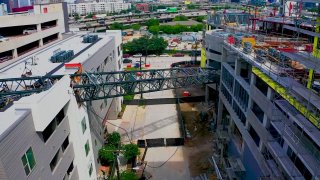
Inside the security of her own home, Kiersten Smith had every reason to feel safe on that summer day — from the approaching storm, from the perils of a booming city, and certainly from the gigantic construction crane that hovered above her.
But as winds whipped into a frenzy, steel buckled and the crane fell, crashing through Smith's apartment and the apartments of dozens of others.
Five were injured, many were left homeless and the 29-year-old Smith was dead, struck down in a tragedy that would have been witnessed by her fiancé, if not for the cloud of dust and debris that consumed their apartment – and the grilled cheese sandwiches he was making at the time.
After the June 9 collapse, NBC 5 Investigates began asking what the state of Texas — the nationwide leader in crane-related deaths — and the city of Dallas are doing to protect the public from such accidents in the future.
The answer can be summed up in one word: nothing.

Local
The latest news from around North Texas.
Told of our findings, Texas Sen. Royce West (D-Dallas) said there should be consideration of new state regulations to better protect the public from the heavy steel and cable that now tower above them.
"We've got to make certain… that people who live under these cranes, in apartments and things like that, that their safety and welfare are taken into consideration," said West, whose legislative district includes the apartment where Smith was killed.
Dallas City Manager T.C. Broadnax declined an interview request with NBC 5 Investigates to talk about crane safety in Dallas.
Instead, the city sent an email that said, "Currently, the city is not pursuing local regulations for the installation, use or maintenance of construction cranes."
"City staff will continue to evaluate policies and procedures regularly and will recommend changes to City leadership as necessary …," the email continued.
The city said it doesn't even keep record of how many construction cranes are up, or where they are located, prompting NBC 5 Investigates to do its own count.
We found 21 in Dallas alone and those were only tower cranes, the largest in the construction crane lineup.
Dallas isn't the only Texas city that ignores the enormous lifts, and the qualifications of those operating them.
The cities of Fort Worth, Austin, San Antonio and Houston also told NBC 5 Investigates they do nothing to regulate or monitor the cranes that go up in a growing economy and building boom.
"The city doesn't track cranes," Houston said in an email, adding: "Also… a building permit is not required to use a crane. Therefore, we would not have stats on current crane use."
The Texas Department of Licensing and Regulation and the Texas Department of Insurance also said cranes, and crane operators, do not fall under their watch, leaving it up to the federal government to provide oversight.
The Occupational Safety and Health Administration, or OSHA, requires third-party inspections of cranes and, since last year, requires that operators be certified by an accredited certifying body.
In an email, OSHA told NBC 5 Investigates that between Oct. 1, 2018 and June 30 it had conducted 40 crane inspections in its Region VI area, composed of Texas, New Mexico, Oklahoma, Arkansas and Louisiana.
Tom Barth, a crane operator and accident investigator with more than four decades of experience, said OSHA inspection requirements don't go far enough.
He said the agency rarely checks the third-party inspection reports, or does its own inspection, unless a formal complaint is filed, or an accident occurs.
"And with all the thousands and thousands of cranes out there all over the United States, OSHA doesn't have that many inspectors…," Barth said.
He also said local inspectors should observe crane operators on the job, noting that all of the 140 crane accidents he investigated involved some sort of operator error.
"Someone has to be watching these crane operators, and they have to have more training," Barth told NBC 5 Investigates, adding: "You can become a certified crane operator within four weeks."
"That's ridiculous," he said.
Texas leads the country in crane-related fatalities among workers, totaling 50 between 2011 and 2017, according to the federal Bureau of Labor Statistics.
That far outpaces the next four states: Florida and New York, each with a total of 16 deaths; and California and Illinois, each with 14 fatalities, the BLS reported.
Despite leading the country in crane deaths, Texas is not on the list of 16 states and seven cities that now have their own licensing requirements for crane operators, according to the National Commission for the Certification of Crane Operators.
After accidents mounted in New York, the city implemented the nation's toughest laws, requiring better job-site supervision, as well as the installation of "black box" devices to record what happens on cranes.
In Bellevue, Washington, after a 2006 crane collapse that killed a man in an apartment, the state passed tough regulations requiring state approval before cranes are installed, and increased training for operators.
And in Chicago, city inspectors check cranes when they are installed, and again each time they are elevated to a higher floor.
"Yeah, we worry," said Dallas business owner Royd Riddell, who was surprised to hear the city did nothing to regulate the skyscraper-high cranes that dwarfed his small shop of antique maps and fine prints.
"That would wipe me out," Riddell said of the tower crane reaching over his business, "and, of course, it would damage the people in the high-rise next to me."
"So, it would be tragic."



